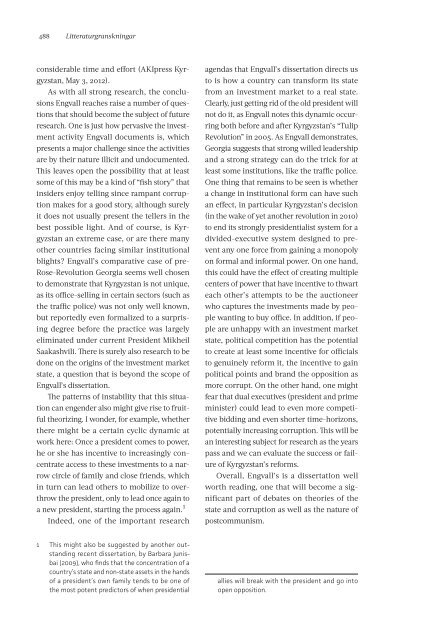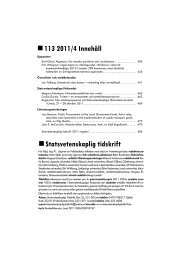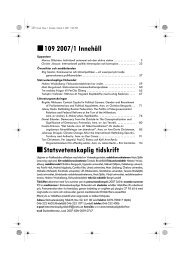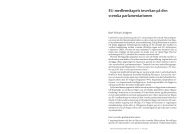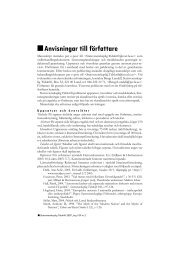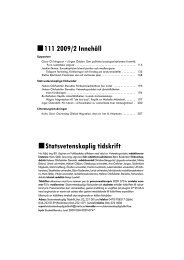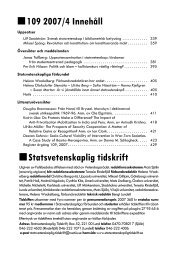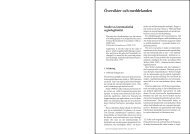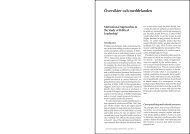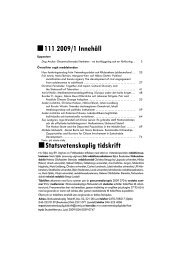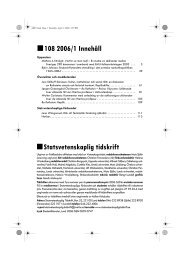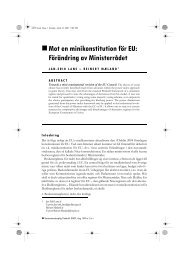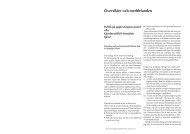Helt nummer 2012/3 (PDF, 1387 kb) - Statsvetenskaplig tidskrift
Helt nummer 2012/3 (PDF, 1387 kb) - Statsvetenskaplig tidskrift
Helt nummer 2012/3 (PDF, 1387 kb) - Statsvetenskaplig tidskrift
You also want an ePaper? Increase the reach of your titles
YUMPU automatically turns print PDFs into web optimized ePapers that Google loves.
488 Litteraturgranskningar<br />
considerable time and effort (AKIpress Kyr-<br />
gyzstan, May 3, <strong>2012</strong>).<br />
As with all strong research, the conclu-<br />
sions Engvall reaches raise a number of ques-<br />
tions that should become the subject of future<br />
research. One is just how pervasive the invest-<br />
ment activity Engvall documents is, which<br />
presents a major challenge since the activities<br />
are by their nature illicit and undocumented.<br />
This leaves open the possibility that at least<br />
some of this may be a kind of “fish story” that<br />
insiders enjoy telling since rampant corrup-<br />
tion makes for a good story, although surely<br />
it does not usually present the tellers in the<br />
best possible light. And of course, is Kyr-<br />
gyzstan an extreme case, or are there many<br />
other countries facing similar institutional<br />
blights? Engvall’s comparative case of pre-<br />
Rose-Revolution Georgia seems well chosen<br />
to demonstrate that Kyrgyzstan is not unique,<br />
as its office-selling in certain sectors (such as<br />
the traffic police) was not only well known,<br />
but reportedly even formalized to a surpris-<br />
ing degree before the practice was largely<br />
eliminated under current President Mikheil<br />
Saakashvili. There is surely also research to be<br />
done on the origins of the investment market<br />
state, a question that is beyond the scope of<br />
Engvall’s dissertation.<br />
The patterns of instability that this situa-<br />
tion can engender also might give rise to fruit-<br />
ful theorizing. I wonder, for example, whether<br />
there might be a certain cyclic dynamic at<br />
work here: Once a president comes to power,<br />
he or she has incentive to increasingly con-<br />
centrate access to these investments to a nar-<br />
row circle of family and close friends, which<br />
in turn can lead others to mobilize to over-<br />
throw the president, only to lead once again to<br />
a new president, starting the process again.1<br />
Indeed, one of the important research<br />
1 This might also be suggested by another outstanding<br />
recent dissertation, by Barbara Junisbai<br />
(2009), who finds that the concentration of a<br />
country’s state and non-state assets in the hands<br />
of a president’s own family tends to be one of<br />
the most potent predictors of when presidential<br />
agendas that Engvall’s dissertation directs us<br />
to is how a country can transform its state<br />
from an investment market to a real state.<br />
Clearly, just getting rid of the old president will<br />
not do it, as Engvall notes this dynamic occur-<br />
ring both before and after Kyrgyzstan’s “Tulip<br />
Revolution” in 2005. As Engvall demonstrates,<br />
Georgia suggests that strong willed leadership<br />
and a strong strategy can do the trick for at<br />
least some institutions, like the traffic police.<br />
One thing that remains to be seen is whether<br />
a change in institutional form can have such<br />
an effect, in particular Kyrgyzstan’s decision<br />
(in the wake of yet another revolution in 2010)<br />
to end its strongly presidentialist system for a<br />
divided-executive system designed to pre-<br />
vent any one force from gaining a monopoly<br />
on formal and informal power. On one hand,<br />
this could have the effect of creating multiple<br />
centers of power that have incentive to thwart<br />
each other’s attempts to be the auctioneer<br />
who captures the investments made by peo-<br />
ple wanting to buy office. In addition, if peo-<br />
ple are unhappy with an investment market<br />
state, political competition has the potential<br />
to create at least some incentive for officials<br />
to genuinely reform it, the incentive to gain<br />
political points and brand the opposition as<br />
more corrupt. On the other hand, one might<br />
fear that dual executives (president and prime<br />
minister) could lead to even more competi-<br />
tive bidding and even shorter time-horizons,<br />
potentially increasing corruption. This will be<br />
an interesting subject for research as the years<br />
pass and we can evaluate the success or fail-<br />
ure of Kyrgyzstan’s reforms.<br />
Overall, Engvall’s is a dissertation well<br />
worth reading, one that will become a sig-<br />
nificant part of debates on theories of the<br />
state and corruption as well as the nature of<br />
postcommunism.<br />
allies will break with the president and go into<br />
open opposition.


